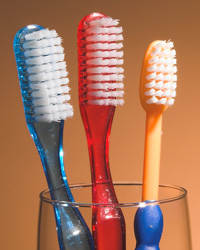Xylitol: Chew Your Way To Healthier Teeth and Gums?
Are you crazy about gum, but not so much about its affect on your teeth? (Good for you!) Researchers presenting at the American Academy of Pediatric Dentistry Annual Session in Cincinnati found a natural sweetener may not only improve the taste of gum, juice and candy, it may also reduce tooth decay and increase dental hygiene.
Their study observed children of Belize over the course of several years, some of whom chewed gum with sugar, others with artificial sweeteners. Results showed that those who chewed gum artificially sweetened with Xylitol, a natural sweetener found in trees and fruit that does not cause cavities, suffered from less tooth decay over the duration of the study.
Another study done in Finland found fewer mothers transmitted cavity-causing bacteria to their children when they chewed gum with xylitol. The bacteria transmission occurs when mother and children share eating utensils.
Xylitol is widely available in most supermarkets, but know that it's difficult to achieve the correct dosing. To see results, you'd have to chew gum with a high dose of Xylitol frequently and for prolonged durations. Products containing this natural sweetener may also cost more than those artificially sweetened with other additives.
So, the next time you're dying for a piece of chewy goodness, consider grabbing a brand containing Xylitol. While it can be difficult to obtain optimum results through its use, it is certainly better for your dental health to chew than gum containing sugar.

+Jim Du Molin is a leading Internet search expert helping individuals and families connect with the right dentist in their area. Visit his author page.
Oral Hygiene and Bad Breath
Bad breath (halitosis) has been the subject of a lot of laughter and some pretty bad TV commercials over the years. Yet, if you're like nearly one in five patients dentists see, you know the embarrassment and insecurity it can bring.
There's no one reason for persistent halitosis. You may have the very best dental hygiene in the world, and still suffer from bad breath. Sometimes it's undiagnosed periodontal disease. Or it could be sinus problems or digestive ailments brought on by stress or other factors. Even though the primary cause of persistent halitosis is almost always a treatable medical condition, millions of dollars are spent yearly for mouthwashes and breath fresheners that barely mask the problem, much less solve it.
Because dentists and dental hygienists take halitosis seriously, some offices have established Fresh Breath Centers. These Centers are dedicated to determining the source and extent of a patient's dental health problem and then treating the cause, not simply covering it up.
If halitosis is a problem for you, you are encouraged to visit an office near you. Their approach will be as thorough and as caring as it is with any of other professional dental procedures. You'll begin with a breath gas analysis that identifies and measures odors. Based on the findings, a simple, effective treatment program will be recommended - so you won't have to worry about bad breath again.
If this problem is undermining your self-confidence, practice preventive dentistry and please call a Fresh Breath Center near you for a consultation. You can schedule an analysis, and get back on the road to breathing freely again.

+Jim Du Molin is a leading Internet search expert helping individuals and families connect with the right dentist in their area. Visit his author page.










